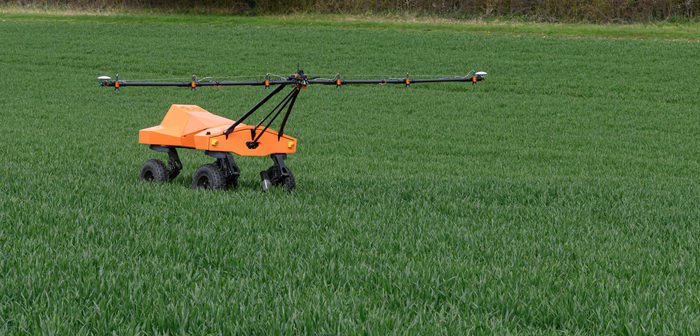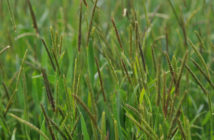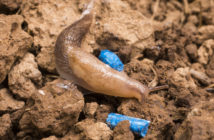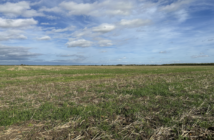…cuts herbicide applications by around 77% and fertiliser by 15%
Small Robot Company (SRC), a British agritech start-up for sustainable farming, today announced the launch of its commercial Per Plant Farming robot services. Pilot trials this season have revealed herbicide applications can be cut by around 77% and fertiliser by 15%. Britain’s first fully autonomous crop-scanning service, it will roll out from this autumn to about 50 farms over the 2022-2023 growing season.
The service will optimise existing sprayer equipment to reduce costs and inputs, using Per Plant Intelligence from SRC’s Tom monitoring robot to treat only the problem areas. The service enables farmers to assess weed density information for no spray decisions, and to reduce herbicide use by around 77% at a conservative estimate, depending on weed density and distribution. Farmers can also assess crop health and performance to cut fertiliser costs by around 15% and optimise crop nutrition. The potential is for far greater savings.
Tom scans the field, building an understanding of where every plant is and what each one needs to achieve optimal performance. Wilma, SRC’s AI Advice Engine then creates treatment maps to advise farmers on the best action to take. This information is used to inform variable rate fertiliser applications and to spot-apply herbicides through nozzle control and sectional control sprays.
“With input costs on the rise, farmers are increasingly under pressure. Up to 90% of inputs are wasted. This is not economically or environmentally viable. Fertiliser alone is a major contributor to agricultural emissions,” comments Sam Watson Jones, President and co-founder, Small Robot Company. “Robotics gives huge scope to close the gap: delivering applications by exception. Precision monitoring alone can provide immediate value, optimising existing sprayers for herbicide and fertilizer applications. But we believe that’s just the tip of the iceberg in terms of the potential for what per-plant farming can deliver, both in input-cost savings and yield enhancement.”
The launch follows successful on farm trials on three farms during the autumn 2021 to 2022 growing season to develop the service, including the Waitrose Leckford Estate and the Lockerly Estate, owned by the Sainsbury family. The trials covered 118 hectares, locating 446 million wheat plants in which 4.6 million weeds were identified. Tom’s six on-board cameras, mounted on a boom, deliver a ground sample distance of 0.39mm per pixel. Among the highest resolution of any crop-scanning technology, this gives Tom the capability to see individual water droplets on leaves and early signs of disease outbreak.
Weed surveys this season have revealed surprisingly few areas of the field where the density was more than one weed/m². With this information, SRC can create heat maps so that farmers can only treat problem areas, rather than blanket treat the whole field.
Farmer demand
The service has launched fully subscribed for 2022, having been offered first on an exclusive basis to SRC’s farmer advisors, with 2023 selling out fast.
Craig Livingstone, farm manager at the Lockerley Estate, one of the first UK farms to sign up for SRC’s robotic services, and National Food Strategy Board, commented: “Above all, I want Small Robot Company to give me the confidence not to take action. Robotics offer us a real chance to answer the many questions of modern agriculture in responding to climate change, carbon sequestration, biodiversity and of course soil and food security.” Lockerley was one of the first three farms to trial the technology in the 2021-2022 season, and is now signed up to the services for the 2022-2023 season. Craig is also a member of SRC’s farmer advisory board.
Andrew Hoad, partner & head of Waitrose’s Leckford Estate, one of the first UK farms to sign up for SRC’s robotic services, commented: “This technology could be truly groundbreaking and has the potential to shape how we farm in the future. By helping us be more precise and targeted in controlling weeds and managing pests, this next generation of farming robots could in turn help us protect biodiversity on our land and preserve the natural environment for future generations.” The Leckford Estate was one of the first three farms to trial the technology in the 2021-2022 season, and is now signed up to the services for the 2022-2023 season. Andrew is also a member of SRC’s farmer advisory board.
Need to develop ways to reduce inputs
Tom Jewers, farmer and contractor in Suffolk signed up to the services for the 2022-2023 season, comments: “We desperately need to develop ways to reduce the need for expensive plant protection products and artificial fertilisers. The ability to treat only the plants that actually need it is game-changing.” Tom is also on the SRC farmer advisory board, taking a lead in co-designing SRC’s robotic service.
Will Evans, forthcoming Oxford Farming Conference co-Chair signed up to the 2023-2024 season, and member of the SRC ‘100 Club’ wider advisory group, commented: “Small Robot Company’s vision for Per Plant Farming encapsulates the future of agriculture – and the scale of opportunity is huge. We’re on the cusp of tremendous change. SRC’s tech is front and centre of the fourth agricultural revolution. The savings that can be made with the Tom robot alone are impressive: and that’s just the first step. Robotic action will be a groundbreaking. This is game-changing.”
Tom Martin, LEAF farming ambassador signed up to the 2023-2024 season, and member of the SRC ‘100 Club’ wider advisory group, commented: “This space-age technology combines the high-yielding ambition of modern agriculture with the ‘baby’s breath’ environmental delicacy of traditional and organic farming. I’m incredibly excited, and proud to be a part of this, and we as a nation should be proud. We led the world in the industrial revolution of the mid-18th century, and we can now claim to be taking a lead in food production and environmental protection in the mid-21st century. A farming and food good news story, finally.”
Rob Macklin, the National Trust’s Head of Farming and Soils, comments: “Technology needs to play a big part in solving many of the issues we currently face in farming – particularly improving soil health and carbon sequestration, reducing our reliance on fossil fuel power and fertilisers and avoiding the adverse impacts of synthetic chemicals on the environment. We have started small robot trials at Wimpole and intend to extend trials to other estates in the near future.”
Precision monitoring service
SRC’s Tom monitoring robot scans the crop to a level of detail that identifies individual plants, gathering data on plant and weed distribution to determine the optimum treatment path. Tom will accurately geolocate and analyse data on every plant in the field. Tom can successfully identify all the wheat plants, determining precise plant counts, as well as broadleaf weeds. With a survey speed of 2.2ha/hr, Tom gathers 15,000 images from its cameras, or 40Gb of per plant intelligence, for every hectare. The new service offering will target:
- Winter wheat crop count and Per Plant visualisation
- Weed detection, geolocation and per plant imagery
- Glyphosate treatment sprayer export
- Herbicide treatment sprayer export
- Fertiliser treatment sprayer export
Future services currently in development or trials include robotic non-chemical weeding; disease identification and fungicide treatment sprayer export; soil sampling and insights; and grass weed classification, including blackgrass. SRC will take plant density information, augmenting this with other metrics, such as biomass assessment, soil insights, physiology, tiller count, growth stage and weather, to support decisions on when and how much fertiliser to apply, and exactly where it’s needed, optimising plant nutrition. Farmers in its 2021-2022 trials believe significant value will come from having the confidence not to spray prophylactically.
SRC’s commercial Per Plant Farming service will be rolled out in “Service Pods”. Pods of up to six local farmers at 120 ha share the use of a Tom robot to create treatment maps, using these with existing sprayer equipment to reduce costs and inputs. Tom will accurately geolocate and analyse data on every plant in the field, made available to farmers in Wilma, SRC’s AI Advice Engine. This means farmers can try out the service on as little as 20ha, without a costly machinery outlay.
Dr Belinda Clarke, Director, Agri-TechE, comments: “The pace of agri-tech innovation in the last 5 years has increased rapidly in recent years and is already showing commercial impact on farms. New tech solutions are poised to make an even more dramatic contribution to increasing the efficiency, productivity and sustainability of global agriculture. Game-changing technologies, coupled with creative, effective partnerships will be key to making this a reality, and those pioneered by Small Robot Company are great examples of how this is happening in practice.”
Sam Watson Jones concludes: “The opportunity is immense. Our technology is closely aligned with the new Agricultural Bill: our technology is at the heart of these systemic changes in farming. Now is the time for us to work together to create a more sustainable farming model: and for farmers – rightly – to be rewarded for their efforts. The recent huge advances in agtech finally make this possible: and farmers are integral to the environmental solution.”




